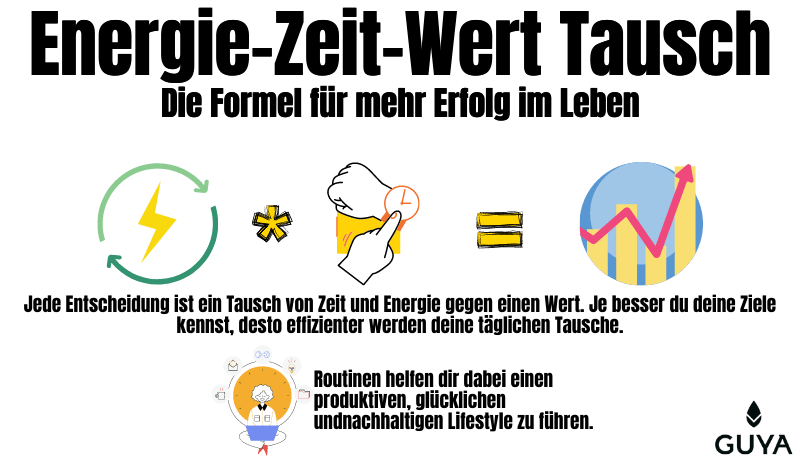Success through efficient time management through self-management

Introduction
With this article I would like to bring you closer to a concept through which you can master your everyday life, study, work and business more successfully. Success means something different for everyone and it is important that you also define success for yourself. Perhaps a time management through self -management is enough for you, but you probably want to get more out of yourself.
For the purpose of this article and out of personal conviction, success means that you are able to get the best out of yourself, get your goals closer every day and finally achieve it.
I would like to emphasize that success does not mean that you can achieve a goal of your physical and mental health.
Table of contents
- What is time?
- What is time management?
- What is self -management?
- A better definition: energy-time value exchange?
- Routines for time management & self -management
- How successful people see time management
- Conclusion - success through time management
1. What is time?
First of all you have to understand that time human construct and actually does not exist. We count the hours, minutes and seconds. We remember, we are planning.
But we can only be now, never in the past or in the future, and that can now mean a different present for two people on the same street at different speeds.
This is difficult to imagine and, if more executed, would also go beyond the framework of the article. What I want is that you have to understand that the past and future only play a subordinate role!
Your now is important. What you really do is important what you have done will influence you, just like what you are planning, but only what is going on in now your time will actually shape.
So let's Time, for this article, as Active describe.
2. What is time management?
According to this definition, time management is very easy to manage/manage/creating/doing various activities.
After all, you cannot take the time out of your watch and put it in a order and then say "So now I have managed my time!”
What you manage are activities that produce a result (e.g. painting an image, finishing an Excel table, or workout). Since it makes sense to do some activities in front of others, you manage activities, but never the time!
In my opinion, time management is therefore a faulty fashion concept! It is about managing (strange German word) of your personal energy.
What is self -management?
The personal energy leads us to the next point. The term time management now sounds much more after the previous description "Manage yourself", Is it? After all, you can't do anything with time, it is as virtual as our bank account, which only consists of 10011010010 in a computer.
When it comes to time management, we get the fundamental, even closer when we baptize it. We put our activities right, of which we think you have the greatest possible effect to achieve our goals. We then stop the time or give ourselves a deadline so that we do not deal with a problem/challenge for too long. And that can help. This virtual pressure, which can then be felt very real, usually brings us, as a rule, Working more efficiently. The eyes of a deadline or the numerical deadlines per day, week, month, helps to decide which of the activities are actually relevant and which only appear as such, but ultimately there are pure energy guzzlers!
After all, our energy level is actually real and limited!
3. A better definition: energy-time value exchange?

Before we go on, let's reflect briefly!
At the beginning we have Time defined as "active creating". Then we showed ourselves that time cannot be managed, but our energy or performance. With the help of time, we will not only manage this energy/performance Effective, but also efficient To use and convert it into an activity, which in turn produces a result.
Time management, self -management or whatever you want to call the optimization of your activities for defined time, is therefore nothing more than an exchange. An exchange of your energy (in a time interval) in an activity or result!
In a formula Expressed it would be on Energy * time = value/result be called! In order to be able to define the value of this result, as mentioned at the beginning, you have to know your goal!
Watching 10 hours of Netflix is a miserable exchange for most people. However, if you earn your money in writing reviews, there may be no better exchange.
In order to consolidate this concept of time-value exchange or energy-value exchange, there are three simple questions that you can ask yourself before an activity:
- What Is my goal?
- Why Do I have this goal?
- How Do I get closer to this goal today?
The first question is important so that you visualize yourself where your trip should go. Question number two underpins and confirms your goal through e.g. values. The last question lets you think about which activity is actually relevant to get closer to your goal.
There is so much noise in this world, everyone wants something from you, be it the letter from the radio post, the email with the new offer or the WhatsApp from a relative. So ask yourself What is/are my goals Why I have this and How I get closer to you today!
4. Routines for time management & self -management
In the introduction of the article, I wrote that it is not a question of achieving a goal on bending and breaking and ultimately to end in burnout or to violate family and friends. It is about continuously working on a certain time to get better in something, to achieve a goal and feel comfortable.
Routines are the key for really good energy/time value exchange.
Do you want to lose weight, generally be more sporty and feel more comfortable in your body? Then you can go to a boot camp for 30 days and get a full tube. In the end you will surely lose a few kilograms, have more performance and perseverance, but you will get back home and 30 days later you are exactly where you were 60 days ago. Did you achieve your goal? Rather not!
The example can probably be played through with everything. The moral of history is that it is not important to reach your goal overnight. This is almost never possible. It is about being able to spend your energy up to tomorrow, the day after tomorrow, the day after and in 6 months. As with an investment, the compound interest effect applies here.
It is best to implement routines into your everyday life by starting to grant very small time windows for them. You want to do more sports, well, every morning you start with 5 minutes. After 2 weeks you increase to 10 minutes. That is 100% increase in two weeks. After 4 weeks you increase to 15 minutes or clear a second time window in the evening or at lunchtime.
With the right Mindset can be routines such as sports and get up early Build more easily than without. So start with the basics instead of starting at the goal.
6. How successful people see time management
It sounds extremely lapidar and somehow not expedient, right? Let us look at why some people are successful:
Were buffet: One of the most successful people when it comes to investments. As one of a few a few year, he manages to get about 20% return on his investments without exception. Year after year. There is no year in which he makes 50% or 100% and then suddenly makes -30%. Millions of people trust their fund and have never lost!
Elon Musk: Richest person Our, still, green planet. He did this through continuous delivery of value by companies. Starting with software, via PayPal, SpaceX, Tesla, Solarcity, Neuralink, Boring Company, Hyperloop and Openaai. He did not start with everything at the same time, but started one project after another.
Mike Tyson: "The Baddest Man on the Planet", "Iron Man", "Kid Dynamite”. A boxing legend! He would never have come to these titles if he hadn't trained continuously.
7. Conclusion - success through time management
I hope I was able to give you an extensive insight into the topic of time management, self -management and the exchange of energy/time.
Successful people know that they have to use the time for themselves.
Successful people understood that time is not real and still plays a role!
Successful people think in years or decades and it is clear to them that everything is possible in such a long period of time!
Success is what you define as a success. For some there are 100 billion in the account of being the best star chef for others and for someone else it is the house with wife/man and three children.
You decide and nobody else has to judge!










